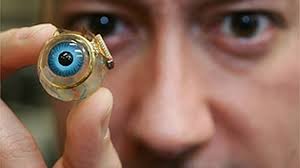
Breaking News
 US Lawmakers Shmooze with Zelensky at Munich Security Conference...
US Lawmakers Shmooze with Zelensky at Munich Security Conference...
 Scientists have plan to save the world by chopping down boreal forest...
Scientists have plan to save the world by chopping down boreal forest...
 New Coalition Aims To Ban Vaccine Mandates Across US
New Coalition Aims To Ban Vaccine Mandates Across US
Top Tech News
 New Spray-on Powder Instantly Seals Life-Threatening Wounds in Battle or During Disasters
New Spray-on Powder Instantly Seals Life-Threatening Wounds in Battle or During Disasters
 AI-enhanced stethoscope excels at listening to our hearts
AI-enhanced stethoscope excels at listening to our hearts
 Flame-treated sunscreen keeps the zinc but cuts the smeary white look
Flame-treated sunscreen keeps the zinc but cuts the smeary white look
 Display hub adds three more screens powered through single USB port
Display hub adds three more screens powered through single USB port
 We Finally Know How Fast The Tesla Semi Will Charge: Very, Very Fast
We Finally Know How Fast The Tesla Semi Will Charge: Very, Very Fast
 Drone-launching underwater drone hitches a ride on ship and sub hulls
Drone-launching underwater drone hitches a ride on ship and sub hulls
 Humanoid Robots Get "Brains" As Dual-Use Fears Mount
Humanoid Robots Get "Brains" As Dual-Use Fears Mount
 SpaceX Authorized to Increase High Speed Internet Download Speeds 5X Through 2026
SpaceX Authorized to Increase High Speed Internet Download Speeds 5X Through 2026
 Space AI is the Key to the Technological Singularity
Space AI is the Key to the Technological Singularity
 Velocitor X-1 eVTOL could be beating the traffic in just a year
Velocitor X-1 eVTOL could be beating the traffic in just a year
Doctors Are Preparing to Implant the World's First Human Bionic Eye

The team is now preparing for what they claim will be the world's first human clinical trials of a bionic eye — and are asking for additional funding to eventually manufacture it on a global scale.
It's essentially the guts of a smartphone combined with brain-implanted micro electrodes, as TechCrunch reports. The "Gennaris bionic vision system," a project that's more than ten years in the making, bypasses damaged optic nerves to allow signals to be transmitted from the retina to the vision center of the brain.
The system is made up of a custom-designed headgear, which includes a camera and a wireless transmitter. A processor unit takes care of data crunching, while a set of tiles implanted inside the brain deliver the signals.
"Our design creates a visual pattern from combinations of up to 172 spots of light (phosphenes) which provides information for the individual to navigate indoor and outdoor environments, and recognize the presence of people and objects around them," Arthur Lowery, professor at Monash University's Department of Electrical and Computer Systems Engineering, said in a statement.
The researchers are also hoping to adapt the system to help those with untreatable neurological conditions, such as limb paralysis, to regain movement.
"If successful, the MVG [Monash Vision Group] team will look to create a new commercial enterprise focused on providing vision to people with untreatable blindness and movement to the arms of people paralyzed by quadriplegia, transforming their health care," Lewis said.

 Going the Way of the Denarius
Going the Way of the Denarius

